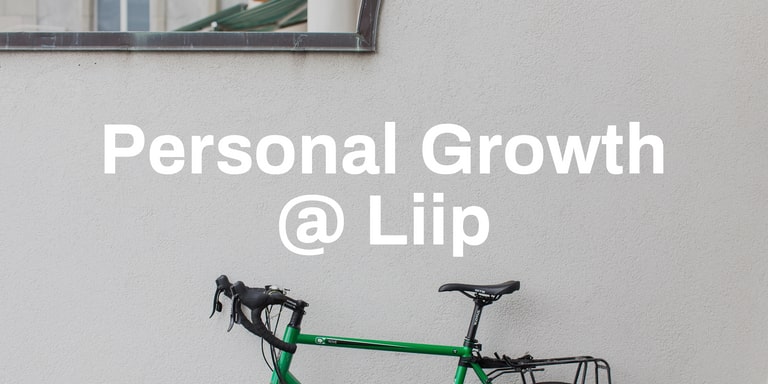Disclaimer
This is my career path, and is just one example of many different options. As you will see, I changed direction several times, whilst others Liipers became increasingly specialised. I wanted to add this disclaimer as an introduction to avoid the assumption that ‘self-organisation’ means constantly reinventing yourself. I hope this helps set the scene a little.
A world of opportunities
I promised to write a short article, so I will not be able to list ALL of the roles/positions I have held at Liip, but here are a few: Developer, Scrum Master, Product Owner, Business Developer, Salary Process Developer, Holacracy Coach, People Developer, Lead Link, Member of the Board of Directors, Agile Coach…
And I can assure you that there have been plenty more... (after all, it has been 11 years! 😉)
This long list of roles highlights two things in particular:
- A company based on roles enables a more precise distribution of responsibilities (there is no need to wait for someone to retire before you can take over some of their responsibilities)
- A passion and desire to learn are powerful motivators, and Liip encourages development in everyone (we will return to this later)
The only constant is change
After just three weeks (!) at Liip, I was summoned by two of the founders: Christian and Gerhard. Uh oh! 😰
Liip was going to stop providing services related to Flash technology. A great plan... except that I was hired for exactly that! This was the first change in a career that would contain many more (most of which were voluntary).
This is probably also the reason why Liip is thought of as being agile: its burning desire to improve and adapt that is never sated. This constant change can become exhausting for some overtime. For me, it is a continuous source of inspiration.
Organic development
Without going into the detail of eleven years of navigating the various opportunities that presented themselves, my career can nonetheless be viewed from various perspectives:
Completing digital projects
Liip is a fantastic factory for digital projects. And it was in this context; I came to Liip: I was passionate about code and joined the team as a developer in 2010. This was when Liip had just started working agile. I was amazed by the framework that Scrum provided for client relationships – everything was much clearer. Clients were responsible for prioritising the options we proposed to them and were incorporated into the project in a completely transparent fashion. This new way of looking at the client/supplier relationship, as two partners on an equal footing, delighted me. I, therefore, began showing a greater interest in this area, becoming a Scrum Master and then a Product Owner. This was a way of understanding where I could provide the greatest value for the team and our clients.
Self-organised leadership
With the support of my colleagues, I took on more and more ‘managerial’ responsibility (obviously not what we actually call it internally 😉). These were relatively vague and poorly defined before Holacracy (‘check with Laurent’), but the transition to a role-based system enabled it to be clarified. I became responsible for organising commitments, the Lausanne office, salaries... these tasks were not always easy to take on, but have enabled me to grow as a person. And I have now been able to pass this on to others as my career has progressed. I am delighted to now guide my colleagues in their development by serving as a mentor.
Agility here and elsewhere
The media quickly picked up our transition to Holacracy in 2016. I was heavily involved in the process, and as a result, I frequently received requests from other companies asking us to help them move towards an agile approach. This was the umpteenth metamorphosis for me and enabled me to put my knowledge of agility to good use in a new way: as a coach, focusing on change management.
‘Role tourism’?
Reading this should not make you think that simply wanting to do something is all it takes to take on a role. Each team has its own ‘role distributor’, responsible for finding the person most suited to a position. In general, as for a traditional job application, a job interview is done based on various criteria: skills, interest in the role, and time available. These criteria result in the form of a ‘contract’: we commit to energising a role for a certain time. There is no tourism here. 🏖️
The energy required for a role also often means that choices have to be made: if I take on this new responsibility, what should I give up to make time for this? This provides vital focus to prevent you from losing your way in this world of opportunities.
The importance of passion, a desire to learn... and the framework provided
Taking on responsibility is exhilarating and requires you to keep yourself in top form constantly. This could be seen when we were creating our agility support service, for example. I realised quickly that as well as being the agility specialist that I already was, I would also need to learn about change management to support our clients. Then came the need for a better understanding of and the ability to categorise different types of leadership... demonstrating the importance of ongoing training alongside these different avenues of development. I also devote a lot of energy to obtaining training and learning new things. My immediate colleagues, my People Developer (internal coach) and Liip’s annual ongoing education budget all offer significant support in this regard.
In summary
As you can see, Liip encourages people to take initiative and responsibility. And this can happen in different ways. So for someone like me who loves discovering new things, I have an opportunity to devote my energies to whatever makes the most sense at any given time.

